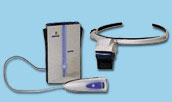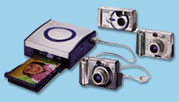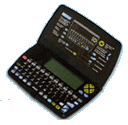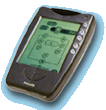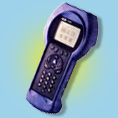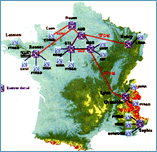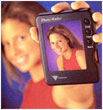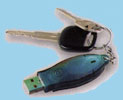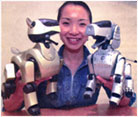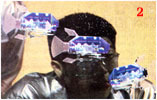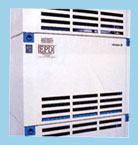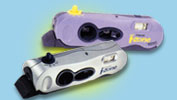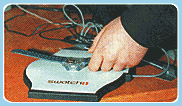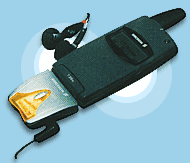
| It's tiny.It weighs next to nothing. Yet it can cap- ture, save and send full size, high - resolution image in an instant. It,s the Ericsson communi- Cam MCA-20-a wee little camera that attaches to the Sony Ericsson T68i mobile phone ( see story on p.28 ). Using the phone's screen as a viewfinder, you can snap pics on the move and send them as email attachments or directly to the screen of another T68i. Photos can also be combined with sound and text and sentas MMS message. KR www.sonyericsson.com Palm Pilots may be passe.The Personal Multimedia Appliance (poma) is a wearable computer,complete with a Liquid Crystal Head Mount Display and end- less multitasking possibilities.The eyepiece lets you see your desktop as you walk down the street.The entire unit weighs only 15.5 ounces,and comes with an optical mouse and a Windows CE computer about the size of a walkman.Get a pouch,shoulder strap or metal carrying case to go with it.TP Those popular, pocket - sized Elph Cameras now have their very own sidekick. The portable Canon Card Photo Printer CP-100 spits out sharp prints in about 60 seconds. A cable connects it the Elph, as well as several other Canon cameras. Just the thing for creating instant history.TP www.canon.com This pacifier looks like just the thing to soothe a cranky baby, but it's got a secret. A remove- able, digital thermometer can easily be placed inside, stealthily getting junior's temperature. A gauge within the sucker measures the baby's temp and a button-sized screen on the front of the pacifier gives results in seconds. Baby will never know. TP Many travelers are multi-lingual, but how many speak 25 lanquages ? Toss the lingo 10 Talk Language Translator in your suitcase and your next vacation will be a breeze. Type in a word ( it has up to 60,000 ) and it will translate it into a foreign lanquage. it will also pronounce it for you and show you how to phonetically sound it out yourself. It stores 10 lanquage ( 25 are available ), has a 32K memory for common phrases, and features a backlit LCD display. TP www.lingodirect.com This digital, 10-inch skillet allows chefs to set a target temperature based on the dish theyre preparing. It will also let you know if the plan is getting to hot. With nine adjustable food programs, a special cookbook, and a nonstick surface, do you really have a good reason to keep ordering out? TP www.digitalcookwareinc.com Perfect for children aged 2 to 10, these colorful computer mice look like friendly bugs. Even better, they make computer clicking easier. Instead of having to tap the mouse, kids just squeeze the top of the bugs head and the mouse, designed for small hands, clicks away. KidzMouse works on PCs or MACs. TP www.kidzmouse.com Forget having a green thumb. All one needs to make this flower bloom are three AAA batteries. The Petal - Chi responds to the human voice, playing up to 40 difference songs. As it "grows" it plays various tunes, from nursery rhymes to rock songs. There are six difference plants to collect. TP www.tigertoys.com This little movies camera lets you capture digital video and audio. Use it with your computer ( it comes with software ) or away home to capture up to four minutes of footage. The IntelPlay Digital Movies Creator lets you edit and add special effects and animation. Send your flicks via email to share with friends. You can also use the camera to take snapshots. TP www.intelplay.com
|
|
||||
![]() 3G just a button push away
3G just a button push away
The world 's first macro base station using third-generation WCDMA technology has been develop.Ericsson ' s RBS 3202 is delivered fully configured, tested and complete from the factory direct to
the site. Power supply, transmission lines and the antennae are connected with simple plug-in
contacts on the roof of the container. The base station's one-com-mand configuration the only
requires a push of the button for start-up.
![]() Sofa surfing made easy
Sofa surfing made easy
Why stay anchored to a desk when you can surf the Internet from the comfort of your living-room
sofa ? Ericsson's new surfbord,the Screen Phone HS210, has a touch - sensities screen, allowing
users to surf,make telephone calls and send e-mail. 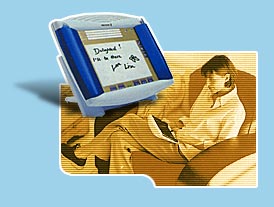
The screen Phone HS210 communicates using the Bluetooth technology and is based on the open Bluetooth operating system. The Screen Phone
will be released in the American Market at the end of the year and will arrive in Europe shortly thereafter.
![]() Jambala-Intelligence
beyond digital wireless
Jambala-Intelligence
beyond digital wireless
New,high-value services that target an increasingly segmented end-user
market are instrumental in retaining and expanding an operator's subscriber base. Scalable
and flexible application platforms are needed to provide the basis for network nodes that
cater to such needs.
| Jambala is a next-generation application platform
that truly fulfills these requirements. In its initial installation, it accommodates
HLR/AC and SCP applications and services for D-AMPS/AMPS networks. Future releases will address the area of mobile-to-mobile and fixed-to-mobile covergence. |
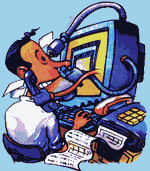 |
| In describing Jambala's architecture and implementation, the author shows how the platform provides a unique combination of availability, reliability, scalability and Internet readiness, all based on commercially available hardware. He further explains how platform support for Java and CORBA technologies yields a flexible, high-value, platform-independent environment in which wervices can becreated as rapidly as the technoloht will allow. |
Application platforms of different sizes and
configurations are needed for building efficient and manageable intelligent network (IN)
nodes. Operators must be able to expand these platforms smoothly and flexibly
in response to market needs. Sustaining network growth means ensuring that node growth can
be scaled within broad limits, while at the same time maintaining the redundancy,
reliability, and availability of performance that is required in network nodes. Tis must
be done in a way that is cost-effective and compatible with future modifications, in order
to provide support for operators' rapidly changing needs.
The principal features and benefits of Jambala are:
- a cost-effective solution;
- efficient, cost-effective operation, administration and maintenance (OA&M);
- zero system downtime;
- flexible and future-compliant architecture;
- multi-application support;
- open service-creation environment (SCE);
- support for convergence.
![]() Commercial
hardware
Commercial
hardware
The application platform on wich Jambala is implemented consists of Ericsson's tel ORB
operating system/middleware (Box B) combined with off-the-shelf hardware components:
- Two OA&M UltraSPARC 300 MHz processors;
- 200 MHz Pentium boards with 512 Mbytes RAM;
- Two 100 Mbit/s Ethernet switches;
- One CD-ROM drive;
- One 40 GB hard drive;
- One SS7/C7 stack;
Figure 1 shows a block diagram of the different components on the Jambala platform, some
of the application it can run, and te external applications and operating systems with
which Jambala can communmicate. Network nodes-such as a service control point (SCP) or a
home location register/authentication center (HLR/AC), which require a high degree of
scalability and must meet stringent, real-time, fault - tolerance requirements - are
implemented directly in Jambala.
Other IN nodes with less strict performance criteria, such as service-creation
environments (SCE) and service-management systems (SMS), can be implemented in off the -
shelf operating systems and hardware.
These nodes can make use of the open CORBA 2.0 interface to access resources and
communicate with applications in Jambala.
Zero - downtime operation
To implement traffic - and memoryintensive network nodes, such as HLRs or SCPs, high
levels of reliability, redundancy and availability must be built into the nodes. Jambala
offers an extensive range of features that
satisfy these requirements:
- Automatic recovery from software errors
- Data fault tolerance and redundancy
- On-line backup
- Adaptive hardware configuration
- Smooth software upgrade
- n+1 hardware redundancy
- Hot-swap replacement
- Heograpical node redundancy
The execution environment provides mechanisms for handling faulty code and erroneous data
that can lead to failures in execution. These mechanisms ensure automatic recovery from
execution failure, or that execution is terminated without affecting network node
operation.
The integrated database supports distributed transactions, thus providing fault tolerance
by continuously replicating data. For example, HLR and SCP data is spread out over several
processors, where it is partitioned, distributed and replicated as distributed
transactions.. In the event of processor failure, traffic processes or OA&M processes
in the nodes are automatically diverted, allowing the nodes to make use of replicated data
in other
processors.
Box B TelORB
TelORB is a distributed operation system for large-scale, embedded (soft), real-time
applications that require very high availability. This requirement can be met thanks to
- the Tel ORB operating system (OS) kernel with appropriate mechanisms;
- a reak-time database;
- software-configuration control;
- an associated development environment.
In addition, CORBA-compliant object request broker and a Java virtual machine run on top
of TelORB
Features and benefits of TelORB
Execution environment-programs are executed in processes that
- are distributed over several processor;
- interact primarily by invoking remote operations.
Real-time, object-oriented database in primary memory-data is replicated at several
physical processors. This configuration makes the system tolerant to hardware faults and
serious software faults.
Software--configuration control--this ensures that the processes in the system execute on
available processor resources, which is especially useful when hardware fails.
A separated management layer for TMN-like operaton and maintenance through an object model
stored in the target system. The object model is displayed via a user interface on a
workstation.
A driver concept that allows application-specific hardware to be used without having to
modify the operating system kernel.
A built-in CORBA 2.0 - compliant object-request-broker core that supports the IIOP for
inter-operability with other systems.
Run-time environments for C/C ++ and Java code.
A software-structuring model in which interfaces can be maintained as separate product
items (which aids the development of large Software systgems). The model is supported by
tools that- compile the source code in the structure;
- build load modules;
- collect information that is needed for configuring the target system.
In-service upgrades of software and hardware with little or no disturbance to operation.
This includes the option of adding processors to increase capacity.
HLR and SCP data stored in the database is log-marked, which means it can be backed up on
line at regular intervals. Backups can be made automatically by the operating system's
backup scheduler, or initiated manually by a system administrator. Theapplication data is
copied to the hard disk, where it is sorted into files in the partitioned backup archive
of the file system. Because it is scaled to use additional hardware resources, the
hardware platform configuration can eliminate any adverse effects that making backups
might have on HLR or SCP performance.
When a processor board is added to the plarform, the platform configuration manager
automatically reallocates data and processes to the new processor according to
configuration data. The configuration manager monitors platform processors and trigers
appropriate alarms should a failure occur. Moreover, if a failure is detected, the
configuration manager will attempt to recover the faulty processor by automatically
reloading processor data and processes with replicas kept in other processors. If these
attempts fail, the configuration manager scarches its information to find an alternate
configuration. The faulty processor's data and processes are then automatically
reallocated to the processors defined in the alternate configuration, and the faulty
processor is blocked.
Upgrading application software in Jambala does not require any system downtime. During an
upgrade, the new version of application software coexists with the old version--the
platform allows for concurrent execution of old and new software in the same processor.
All software proscsses running while the upgrade takes place are allowed to continue using
the old software, whereas all new processes are channeled into the new software.
Jambala offers n+1 redundancy for all processing elements, memory units, and signaling
links contained in a network node, which means that a Jambala network node can have no
single point of failure. The OA&M processor operates in hot-standby mode to ensure
continuous OA&M system availability. The network's signaling links and processor
boards operate in load-sharing mode --a highly suitable mode for distributing traffic and
providing continuous high-capacity operation. The application platform can also be readily
deployed in a configuration based on geographical redundancy, which ensures that network
node failure resulting from, say, a natural catastrophe at the site of an HLR or SCP will
not have an impact on overall network performance.
Linear scalability
Increasing numbers of wireless subscribers and predicted increases in cellular voice, data
and services are pressing HLR and SCP vendors to offer solutions with scalavble memory,
processing, and signaling capabilities. The Jambala platform offers a linearly scalable
solution for all of these areas
Jambala's scalability allows operators to expand network nodes to accommodate traffic
growth patterns. The HLR, for example, is used in areas where subscriber levels are high
but where the number of active subscribers is relatively low, typically 25% to 40% of the
total number. Where this ratio applies, operators can configure the initial system with
tailored memory/processing capacity and a signaling capacity that matches the activity
level. As the number of subscribers and subscriber activity increases, operators can
expand the system in a cost-effctive way.
Internet-ready OA&M
Internet-based OA&M solutions are becoming more prevalent in the mobile-communication
industry. Flexibility, platform-independence, low cost, and rapid application development
are among the strongest drivers toward solutions of this kind. Jambala offers an OA&M
solution using a telecommunications management network (TMN) model and a management
information base (MIB). The features of this OA&M system include:
- a managed object view of node resources;
- a manager-agent system that performs node-resource operations;
- CCITT-based notification formatting;
- Common management information services element-based (CMISE) manager-agent interaction;
- CORBA-based alarm/notification service;
- alarm management functions;
- security management functions;
- performance management functions;
- system management functions;
- Web-based graphical user interface;
- oper SCE for the differentiation and customization of service
Communication with the OA&M agent takes place over an interface that is compliant with
CORBA 2.0,
CORBA compliance is achieved by using inter-ORB (the general inter - ORB protocol, GIOP)
together with with the Internet inter-ORB protocol (IIOP). The GIOP specifies a set of
message formats and common data reqresentations for communicating with other ORB-based
systems or nodes. GIOP messages are exchanged over TCP/IP networks by means of the IIOP,
which allows the Internet/intranet to serve as a bridge that customer operating systems
can straddle to perform on-line, on-site and remote OA&M operations. This gives
operators a Web-based OA&M solution and the ability to develop and use new OA&M
applications.
Java support
The Jambala platform contains an integrated, real-time Java virtual macine (Figure 10)
that allows Java applications to be developed on or ported to the application platform.
The SCP and associated wireless IN (WIN) services are examples of applications that have
been developed in Java.
In addition, the built-in database provides an application program interface (API) that is
compliant with the object database management group (ODMG), thus enabling application
portability across different database management systems (DBMS). The API adds to the Java
programming laguage the binding that Java applications need for interfacing directly with
the database and for exploiting its strong reliability, availability and redundancy
characteristics.
Support for convergence
Support for convergence is becoming increasingly important in a world of deregulation, new
end-user demands, multiple network operators, and merging technologies. The key features
of a convergence node are adaptability and flexbility; that is, the node's ability to
reuse existing infrastructure and technology as well as to incorporate new developments
and technologies. Jambala's Internet readiness and scalable support of real-time Java
applications and multiple protocols make it an ideal mobile-to -mobile and fixed-to-mobile
covergence node
.
Applications
HLR/AC
One of the first applications to be implemented on the Jambala platform will be an HLR/AC
for digital, advanced mobile phone service (D-AMPS). Operators will obwerve that the
scalability of memory and signaling links offered by the new platform allow them to
dimension the HLR/AC to match subscriber and traffic in their mobile network.
SCP
A WIN Phase 1-capable SCP (PN-3660,Figure 9) has also been implemented on the Jambala
platform. This application uses the platform's distribution mechanisms to trigger WIN
services in the SCP , a network node that is implemented using the Java virtual machine
and the platform's built-in DBMS API. By using the Java virtual machine to implement the
SCP, operators can also use JavaBean technology and commercially available software
development tools (such as Java Studio) to design and implement end-user servvices. An
important feature of JavaBean is its modular nature, which lends itself to reusability
when operators create multiple services. For example, JavaBean provides the basic blocks
that operators need to build WIN services.
SCE/SMS
By using JavaBean technology, operators can use commercially available design environments
as SCEs, creating, implementing and customizing their own WIN services. JavaBean
technologies provide a library concept of sorts,whose components can be used for
customizing and enhancing end-user services. Furthermore, operators can use other
technologies, such as push technologies, to remotely update and add to their JavaBean
libraries. Because SCE/SMSs have less stringent real-time and fault-tolerance requirements
than SCPs or HLRs, they can exploit the application platforms' ability to allow
application to be run on other operating systems, as well as its capacity for interfacing
with the platform's SCP via the CORBA 2.0 interface.
Future architecture
Since the architecture of the apllication platform is modular, each component in the
system can be independently evolved and upgraded. Therefore, the evolution of the system
is best discussed in terms of its individual components.
Processing capability
The processing system consists of several commercially available processor boards that can
be replaced without affection system availability. Thus, operators can capitalize on
innovations in processor technology that are gaining ground in the computer industry,
thereby maximizing the price-to-performance ratio for node growth in their own networks.
Signaling capability
Te signaling system provides support for SS7 and C7 signaling. Because the system consists
of commercially available network signaling products, operators can integrate improvements
and upgrade the system in a cost-effective manner.
TelORB operating system/middleware
TelORB is a real-time, fault-toterant and scalable operating system/middleware solution.
The ongoing in-house development of this product, which is supported by Ericsson's
patnerships in the industry, insures that the product and its external interfaces will
evolve in response to market demands.
OA&M support
The system's OA&M component will be the first commercial implementation of a TMN-based
interface that is compliant with CORBA 2.0 IIOP. In addition, it can easily be integrated
into other operation system; for example, those of new or established operators.
Conclusion
Jambala provides operators with a unique combination of cost-effectiveness, performance
and scalabilety. It uses commercially available hardware, which ensures that its
price-to-performance ration is second to nonein the industry.
The Tel ORB operating system gives the robust Jambala platform outstanding, realtime node
performance, and Jambala's modular hardware design provides flexible scalability wihtin
broad limits.
The combination of object-oriented design, Java support, and Internet readiness offered by
the platform gives operators the versatility and flexibility they need to remain
competitive as they enter the next century.
It's a Local Call
If you need a primer on just how quickly cyber technology evolves, consider Internet
protocol (IP) telephony. A mere two years ago, critics were dismissing Internet telephony
as little more than a toy for computer nerds. At the time, IP telephony --inwhich voice
signals are transmitted over the Net--required users to speak into microphones on their
PCs. Not exactly the most convenient way to old a conversation. Worse, since the voice
signals travelled over the public Internet, the sound quality was, at best, spotty.
| While IP telephony was initially targeted at the consumer market--driving long distance calling rates down to ridiculously low levels in deregulated markets--the service is now being packaged for corporate users. According to Heidi Bersin, senior vice-presi-dent at Clarent Corporation, a US-based IP telephony specialist, the first business applications for Internet communications will be the merging of voice onto corporate intranets for long distance call and faxes. Like consumers, business users should save a bundle wiht these services--some analysts say as much as 60 percent on overseas calls. Down the road, industry experts say Internet telephony should also dramatically cut costs on toll free numbers for company call centers. | 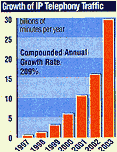 |
But the killer IP telephony application for
corporates may be jst around the corner. US - based oCen, which operates the largest
managed Internet telephony network in Asia, has already begun beta testing a product
called CommPortal.Accessed via a single graphical interface on a user's PC screed,
CommPortal offers a suite of communications aplications--voice and fax messaging, unified
messaging (consolidation of all your voice mail, e-mail and faxes into one mailbox), video
conferencing, as well as the ability to hold real-time conversations with anyone on the
network, Because these applications are transmitted via a managed IP system, they should
be much cheaper than comparable offerings sent out over leased - line or standard phone
networks.
James Courtney, COO at oCen, sees IP telephony as the future of business communications.
"There is a merging of tecnoloty," he explains. "Finally, the barriers
between phones and PCs are breaking down." For corporate managers tired of operating
separate computer and telephone networks, the crumbling of those walls can't come soon
enough.
At 23.5 x 57 millmeters wide and eight millimeters high ( one by two inches and 0.3 inches high ) , Ericsson 's Macrodens Power module is about the size of a pack of chewing gum. Essentially a DC to DC converter, the power module converter 24 or 48 volts into anywere from 2 to 10 volts. Widely used within the telecom industry , as well as in avionics and high-end computers , the MacroDens power Module comes in 40 varieties, with five to 10 new models introduced each year. |
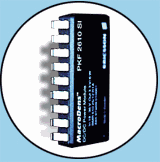 |
Not much can shock an R250 PRO. The Ericssonn mobile phone , due in the third quarter of 1999, is made for outdoor communications in tough environments. It is shock-, dust- and waterproof. It was developed for use on GSM 900 an GSM 1800 networks and support both GSM phase2+techology and the GSM Pro system , combining the advantages of GSM phones with Private Mobile Radio ( PMR ) fuctionality. Features include enhanced full rate ( EFR ) speech coding , data and fax capabilities , built-in speaker phone, automatic answer on group calls and push -to-talk functionality with loudspeaker. |
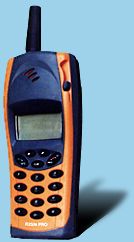 |
It's blue, it's the size of a large
notebook, and it can tackle the telephone traffic of an entire office.Even better , it can
be set up to run across a local area network, the Internet, or a wide area network. This
means you don't nneed separate wiring for your phone system ad you significantly reduce
voice transmission costs between offices. |
Ok, so the Tigris MultiService Remote Access Platform won a "Hot Product of the yeat"award last year from Data Communications magazine. The question is, why ? Probablybecause Tigris delivers a scalable, carrier-class solution capable of supporting a variety of remote access and backbone 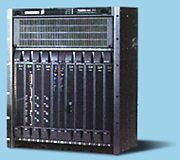 communications technologies from a single chassis.The platform provides both dial-in add
dedicated access as well as high-performance routing. This means Tigris can meet the needs
of carrier and Internet services providers' customers while consolidating access lines ,
equipment and network management.
communications technologies from a single chassis.The platform provides both dial-in add
dedicated access as well as high-performance routing. This means Tigris can meet the needs
of carrier and Internet services providers' customers while consolidating access lines ,
equipment and network management.Tigris was developed by Advanced Computer Communications, now part of Ericsson 's Boston-based Datacom Network and IP Services. |


